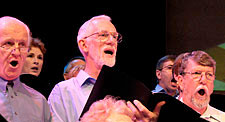When in the midst of the Reformation John Calvin was asked to spell out the reasons for reform, he listed the two defining elements of Christianity as "a knowledge, first, of the right way to worship God; and, secondly, of the source from which salvation is to be sought".
 The order here is important. According to Calvin salvation is a means to an end, with the worship of God being that end. In fact, Calvin says, our public worship together is a foretaste of the worship that lies before us in heaven above.
The order here is important. According to Calvin salvation is a means to an end, with the worship of God being that end. In fact, Calvin says, our public worship together is a foretaste of the worship that lies before us in heaven above.
As such worship is not so much about fellowship, mutual encouragement, entertainment, sermon tasting, nor even education or saving souls, but rather a meeting with God.
Knowing how great the temptation is to human idolatry - witness the medieval church - Calvin paid particular attention to what would later be called the regulative principle, by which he understood that nothing should find a place in worship unless sanctioned by Scripture.
In designing a liturgy appropriate to this end we find in Calvin's liturgy a natural progression, a movement replicated each week. First a coming to terms with our own sinfulness, including confession, followed by hearing the assurance of forgiveness followed by praise, then the reading and preaching of the Word followed by the pastoral prayer and then finally the sacraments - baptisms and celebration of the Lord's Supper.
So let us join the congregation at the old Genevan Cathedral Church of St Peter's next Lord's Day with the reformer Jean Calvin presiding. What shall we observe?
Well, certainly a solemn, serious gathering. Calvin stands behind the table at the start of the service - later he will move to the pulpit - dressed in the street clothes of the time with cap in place. The congregation will be seated but kneel during prayers.
The old Church is unadorned, centuries of Catholic accretions have been removed, this to prevent our thinking of it as some facsimile of the temple in Jerusalem. Calvin knew the real place in which we worship is heaven. For Calvin, God's people in worship ascend to the very throne room of God in communion with ascended Christ.
During the service, the prayers will be spoken by Calvin: some are set prayers and some of free composition. The congregation will together say the Lord's Prayer and later during the pastoral prayer following the preaching of the
Word, prayers will be offered for rulers, pastors, all people everywhere, the afflicted and those gathered in worship. This prayer will include an extended paraphrase of the Lord's Prayer.
There is no choir or musical instruments. The congregation will sing unaccompanied during the service various Psalms, the ten commandments, the Apostles Creed and at the close of worship, the Song of Simeon. The tunes have been designed to be reverent in relation to God and singable for the congregation.
Calvin generally preached from the New Testament on the Lord's Day, usually continuing from the same book morning and evening until completed and then moving to another book.
In preaching, over about forty minutes and without notes, he worked his way through the Greek text, translating it in his own words, and then explaining it phrase by phrase, verse by verse.
His sermons demonstrate great warmth, passion and love for Christ. The language is at times earthy, always memorable, full of application, contain apt illustrations from life and remain intensely practical. He was not above directing personal comments as when pausing midway through a sermon one day to say, "those three drunkards back there might just as well have stayed in the tavern, for all the good they are getting from listening to the Word of God"!
The modern inclination to set worship in the broader context of that which we yield God in every aspect of our lives has doubtless great merit.
I submit the sometimes expressed corollary of deprecating the weekly public worship of God by the family of God, locally gathered and preferably undivided by age amounts to a serious loss of our reformational heritage. The 500th anniversary of Calvin's birth provides an opportunity to think again about the practice of corporate worship.



























